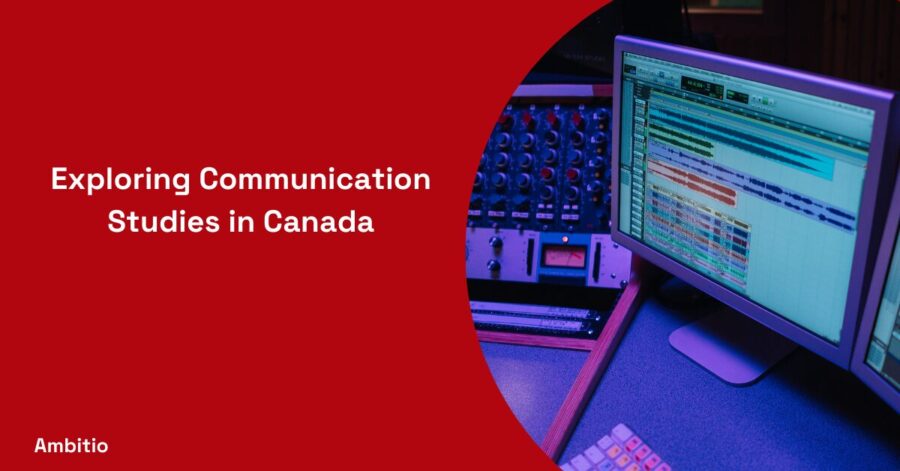12 December 2024
7 minutes read
Exploring Communication Studies in Canada: Comprehensive Guide to Courses, Universities, and Career Prospects in 2023

Introduction
Communication Studies in Canada is an ever-evolving and exciting field, attracting students globally with its diverse courses and career opportunities.
As we step into 2023, the landscape of communication studies in Canada continues to flourish, offering an array of programs at prestigious universities and colleges.
This comprehensive guide delves into the various aspects of pursuing communication studies in Canada, highlighting the top universities, diverse specializations, career prospects, and the unique opportunities available for both domestic and international students.
The Dynamic World of Communication Studies in Canada
Why Choose Canada for Communication Studies?
Canada stands out for its high-quality education system, and its universities are renowned for their cutting-edge communication and media studies programs.
The country’s multicultural environment provides a unique perspective on global media trends, making it an ideal destination for aspiring communication professionals.
Courses in Canada are designed to blend theoretical knowledge with practical skills, preparing students to navigate the complexities of the media and communication industry effectively.
Leading Universities and Colleges in Communication Studies
Canadian universities, including the University of British Columbia, University of Alberta, and Concordia University, offer comprehensive communication programs.
These range from undergraduate degrees to PhDs in communication and media studies. Colleges like Seneca also provide practical diploma and certificate courses, focusing on hands-on experience.
Each institution boasts a unique approach, with some emphasizing theoretical foundations, while others focus on practical skills and industry connections.
A Closer Look at Specializations and Course Offerings
Communication courses in Canada cover a wide spectrum, from traditional media studies to emerging digital media fields. Specializations like public relations, media production, and digital media management are increasingly popular, reflecting the industry’s current needs.
Advanced programs like the Master of Digital Media offer specialized training in digital technologies and strategies, catering to the evolving demands of the media landscape.
Career Pathways and Industry Connections Post-Graduation
Pursuing communication studies in Canada opens a world of diverse career opportunities. Graduates are well-prepared to enter various sectors within the media and communication industry. Here’s a detailed look at the potential career paths and the importance of industry connections post-graduation:
- Diverse Career Roles
- Media Management: Graduates can oversee operations in media houses, handling content strategy, distribution, and audience engagement.
- Public Relations: Crafting and maintaining a positive public image for organizations, handling media communications, and crisis management.
- Digital Marketing: Specializing in online marketing strategies, including social media, content marketing, and search engine optimization.
- Journalism and Reporting: Working as reporters, journalists, or correspondents for various media platforms, including digital, print, and broadcast.
- Corporate Communications: Managing internal and external communication for corporations, including employee communication, brand messaging, and stakeholder relations.
- Market Research Analyst: Analyzing market trends and consumer behavior to guide marketing and communication strategies.
- Content Creation and Strategy: Developing content for various platforms, ensuring it aligns with the brand’s voice and audience expectations.
- Advertising: Designing and implementing advertising campaigns across various media.
- The Role of Internships and Co-op Programs
- Many communication programs in Canada offer internships and co-op placements, providing students with hands-on experience.
- These opportunities allow students to apply their classroom knowledge in real-world settings, enhancing their practical skills.
- Internships often lead to professional networking opportunities, which can be crucial for job placement post-graduation.
- Building Industry Connections
- Networking events, seminars, and workshops are common in communication programs, allowing students to connect with industry professionals.
- Alumni networks of universities and colleges often play a significant role in helping graduates find job opportunities and mentorship.
- Transition to Professional Life
- Career services provided by universities help in resume building, interview preparation, and job search strategies.
- Graduates often have access to job portals and recruitment events exclusive to their university or college.
- Opportunities in the Digital and Emerging Media Space
- The growing digital landscape offers roles in social media management, digital content creation, and online community management.
- Emerging fields like virtual reality, podcasting, and mobile media also provide unique career opportunities for communication graduates.
- Freelance and Entrepreneurial Opportunities
- Graduates with a knack for entrepreneurship can venture into freelance writing, consulting, or start their own media-related businesses.
- Independent projects and start-ups are increasingly common, supported by the diverse skills acquired in communication studies.
- International Opportunities and Global Perspectives
- The global nature of communication and media allows for career opportunities worldwide.
- Skills learned in Canadian universities, known for their multicultural approach, are highly valued in the global job market.
By exploring these various pathways and leveraging the industry connections formed during their academic journey, graduates of communication studies in Canada are well-positioned to embark on rewarding professional careers in a dynamic and ever-evolving field.
The International Student Experience in Canadian Communication Programs
Canada’s welcoming and diverse culture makes it a favored destination for international students. Universities offer a range of support services to help international students acclimate. Additionally, scholarships and financial aid are available to assist with tuition and living expenses.
The experience of studying in a multicultural environment is invaluable for students pursuing a career in the global field of communication.
Scholarships and Financial Support for Communication Studies
Securing financial support is a crucial aspect for many students pursuing higher education in communication studies in Canada. Here’s a breakdown of the various scholarships and financial aid options available to students:
- University-Specific Scholarships
- Many Canadian universities offer scholarships specifically for communication studies students. These can be merit-based, need-based, or a combination of both.
- Examples include the University of British Columbia’s International Major Entrance Scholarship and Concordia University’s Communication Studies Graduate Fellowship.
- Government and Publicly Funded Scholarships
- The Canadian government, as well as provincial governments, provide scholarships for domestic and international students.
- Programs like the Vanier Canada Graduate Scholarships and Canadian Commonwealth Scholarship Program are notable examples.
- Private and Corporate Scholarships
- Corporations and private foundations often offer scholarships for students pursuing communication and media studies. These may be linked to internships or employment opportunities after graduation.
- Examples include the CBC/Radio-Canada Scholarship and the Bell Media National Fellowship.
- International Student Specific Scholarships
- Universities in Canada offer scholarships aimed specifically at international students to help them manage tuition and living costs.
- These scholarships can be based on academic excellence, leadership qualities, or community involvement.
- Bursaries and Need-Based Grants
- Apart from scholarships, students can apply for bursaries and grants, which are typically need-based financial aids.
- These are designed to support students who may have financial constraints that could hinder their educational progress.
- Work-Study Programs
- Work-study programs allow students to work part-time on campus while studying. This helps them earn money to cover their living expenses and gain valuable work experience.
- These positions are often flexible, accommodating the students’ academic schedules.
- Graduate Assistantships and Fellowships
- For postgraduate students, many universities offer teaching and research assistantships, which include a stipend and sometimes a tuition waiver.
- These positions provide students with an opportunity to work closely with faculty on research projects or teaching tasks, enhancing their academic experience.
- External Funding Opportunities
- Students can also seek scholarships and grants from external organizations related to communication and media.
- Professional associations, non-profit organizations, and community groups often have funding opportunities for students in specific fields of study.
- Loan Programs for Canadian and International Students
- Loan programs, both governmental and private, are available to help students finance their education.
- For international students, some Canadian banks offer student loans without requiring a Canadian co-signer.
- In-House Financing Options
- Some universities offer their own financing plans, allowing students to pay tuition in installments rather than a lump sum, easing the financial burden.
- Some universities offer their own financing plans, allowing students to pay tuition in installments rather than a lump sum, easing the financial burden.
By exploring these various scholarship and financial support options, students can find effective ways to finance their communication studies in Canada, making their educational goals more attainable and less financially burdensome.
Navigating Admission Requirements and Application Process
Applying for communication studies programs in Canada involves a series of steps and requirements. Here’s a detailed guide to help prospective students navigate the admission requirements and application process:
- Academic Requirements
- Undergraduate Programs: Typically require completion of high school with a satisfactory grade point average (GPA). Specific course prerequisites may vary depending on the program.
- Postgraduate Programs: Require a bachelor’s degree, preferably in communication or a related field. GPA requirements can vary, with competitive programs often requiring higher GPAs.
- English Language Proficiency
- Non-native English speakers must demonstrate English proficiency, usually through standardized tests like IELTS, TOEFL, or PTE.
- Minimum score requirements vary between universities and programs.
- Portfolio or Work Samples (For Certain Programs)
- Some specialized communication programs may require a portfolio or samples of previous work, such as articles, video productions, or digital content.
- Some specialized communication programs may require a portfolio or samples of previous work, such as articles, video productions, or digital content.
- Letters of Recommendation
- Most programs ask for letters of recommendation from academic or professional references who can vouch for the applicant’s abilities and potential.
- Most programs ask for letters of recommendation from academic or professional references who can vouch for the applicant’s abilities and potential.
- Statement of Purpose or Personal Essay
- Applicants typically need to submit a statement of purpose or personal essay, outlining their interests, goals, and reasons for choosing the program.
- Applicants typically need to submit a statement of purpose or personal essay, outlining their interests, goals, and reasons for choosing the program.
- Resume or Curriculum Vitae
- A detailed resume or CV showcasing academic achievements, work experience, and any relevant extracurricular activities.
- A detailed resume or CV showcasing academic achievements, work experience, and any relevant extracurricular activities.
- Application Forms and Fees
- Complete the application forms for the chosen universities. Application fees are usually required and vary by institution.
- Complete the application forms for the chosen universities. Application fees are usually required and vary by institution.
- Deadlines and Timelines
- Be aware of application deadlines, which can differ between universities and programs. Some programs may have rolling admissions, while others have strict deadlines.
- Be aware of application deadlines, which can differ between universities and programs. Some programs may have rolling admissions, while others have strict deadlines.
- Interviews or Additional Assessments
- Some programs may require an interview or additional assessments as part of the admissions process.
- Some programs may require an interview or additional assessments as part of the admissions process.
- Financial Proof for International Students
- International students may need to provide evidence of financial capability to cover tuition and living expenses in Canada.
- International students may need to provide evidence of financial capability to cover tuition and living expenses in Canada.
- Study Permit for International Students
- Upon acceptance, international students must apply for a Canadian study permit, which requires acceptance from a designated learning institution and proof of sufficient funds.
- Upon acceptance, international students must apply for a Canadian study permit, which requires acceptance from a designated learning institution and proof of sufficient funds.
- Preparation for Transition
- Prepare for the transition to university life, especially for international students, which includes arranging accommodation, understanding health insurance requirements, and familiarizing oneself with the new environment.
- Prepare for the transition to university life, especially for international students, which includes arranging accommodation, understanding health insurance requirements, and familiarizing oneself with the new environment.
By carefully following these steps and ensuring all requirements are met, prospective students can smoothly navigate the application process for communication studies programs in Canada.
Conclusion
In conclusion, communication studies in Canada offer a rich and diverse educational experience, preparing students for a dynamic career in the media and communication industry.
With a range of courses, specializations, and top-tier universities to choose from, students have the opportunity to tailor their education to their career aspirations.
The blend of theoretical knowledge and practical skills, along with the multicultural learning environment, makes Canada an ideal destination for aspiring communication professionals.
FAQs
What is the average cost of studying communication in Canada?
The cost varies depending on the university and program, with scholarships and financial aid available to ease the financial burden.
Are there part-time work opportunities for students in Canada?
Yes, students can work part-time during their studies, which helps them manage living expenses and gain practical experience.
How important are internships in communication studies programs in Canada?
Internships are crucial as they provide real-world experience and networking opportunities, enhancing employability after graduation.
Can international students stay in Canada after completing their communication studies?
Post-graduation work permits allow international students to work in Canada after completing their studies, offering a pathway to gain professional experience.
What are the language requirements for international students?
Non-native English speakers typically need to prove their proficiency through tests like IELTS or TOEFL.
Is it necessary to have a background in communication to apply for these programs?
While a background in communication is beneficial, many programs welcome students from diverse academic disciplines.

You can study at top universities worldwide!
Get expert tips and tricks to get into top universities with a free expert session.
Book Your Free 30-Minute Session Now! Book a call now




























